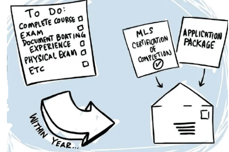Once a student successfully completes our online captain’s license course and passes our final exam, we will award you a certificate that shows your knowledge and understanding have been proficiently demonstrated for obtaining a USCG captain’s license.
Since the certificate fulfills all the written requirements of the Coast Guard, you will not need to take an exam in person or go to a physical location for testing. The certificate is valid for 1 full year. Within that year you MUST submit your application to the Coast Guard via one of the Regional Exam Centers (RECs).
Included with the certificate from MLS, applicants will also submit the following:
MLS students will be responsible for completing the Coast Guard application. There is a fee of $145 associated with the application.
You will need to take form CG-719B to a local notary and have them authorize the oath on page 4, section IV. Make sure to sign in front of the notary and have both of your signatures match the dates. They can place their seal over your signatures or the ample blank space on page 5.
 A physical examination is required to ensure the future captain is in good health. You can go to a doctor's office to get your physical done. A physician, physician assistant, or nurse practitioner can fill out and record their findings on form CG-719K.
A physical examination is required to ensure the future captain is in good health. You can go to a doctor's office to get your physical done. A physician, physician assistant, or nurse practitioner can fill out and record their findings on form CG-719K.
For form CG-719P, you will need to take a 5-Panel urine test at a DOT-approved self-pay facility.
You can also try where CDL truck drivers or FAA pilots get drug tested in your area.
Check out this article for more insight: Do I Need to Pass a Drug Test for a Captain's License?
The Coast Guard requires you to have at least 360 days of boating experience since you were 16 years old, with 90 of those days in the last three years for recency. Most people have not kept a formal log, so in place, you will be filling out form CG-719S.
- If you were aboard your own vessel, you will sign off that time and provide proof of ownership (including registration, vessel documentation, insurance card, or a sales receipt)
- If the time was on someone else's boat, you would need the signature from the owner of the vessel
The Coast Guard is not looking for log books or official records to certify this time. Filling out the forms is done off the honor system; it is your best guess!
Here is a short video to explain the process.
TWIC Card (Background Check)
 You will need to get a background check administered. This is commonly known as the TWIC card. An individual must provide biographic and biometric information, such as fingerprints, and sit for a digital photograph. Also, they must successfully pass a security threat assessment, which is conducted by TSA.
You will need to get a background check administered. This is commonly known as the TWIC card. An individual must provide biographic and biometric information, such as fingerprints, and sit for a digital photograph. Also, they must successfully pass a security threat assessment, which is conducted by TSA.
Pre-enrollment is recommended as it's designed to save the applicant time by enabling them to provide their biographical information and make an appointment for in-person enrollment.
Adult First Aid/CPR Certification
You will need Adult CPR and Basic First Aid for your original captain's license. This can be done in person through the Red Cross, Heart Association, or a Coast Guard-approved course. You attach a photocopy of your card or certificate to the application package.
Blended and online courses are rarely accepted. Please call the Coast Guard to verify the class at 888-427-5662.
If you have any convictions, even if it was expunged, you will complete form CG-719C. This is used to disclose convictions from the applicant's history. Be truthful on these forms and do not attempt to hide anything as the Coast Guard will find out.
 Before submitting your application, please look over our checklist as a reference. You will send everything in your application package electronically to the National Maritime Center.
Before submitting your application, please look over our checklist as a reference. You will send everything in your application package electronically to the National Maritime Center.
Regardless, if you choose Mariners Learning System or another option, you will be responsible for completing the application submission process.
Feel free to reach out to us with any questions concerning the application process at (609) 303-0664, M-F 9 am – 5 pm EST.




Let Us Know What You Thought about this Post.
Put your Comment Below.